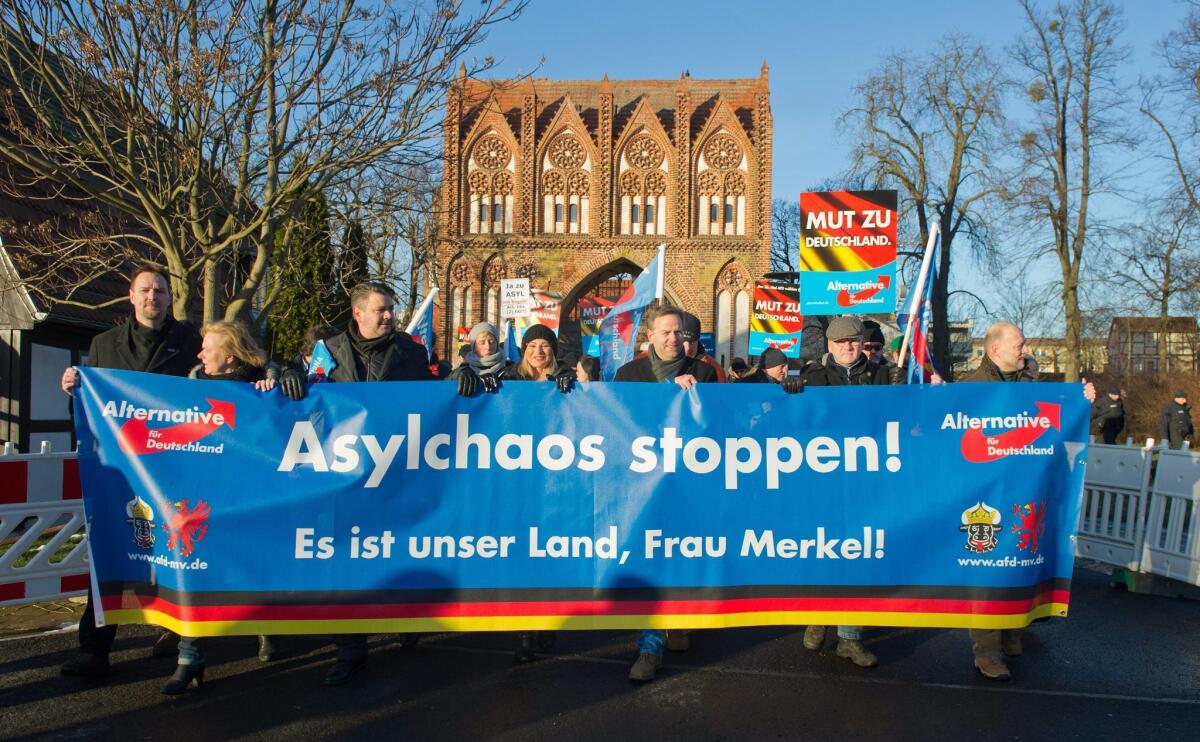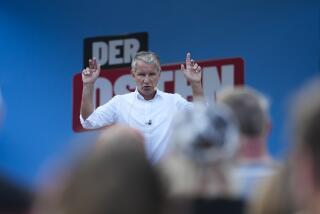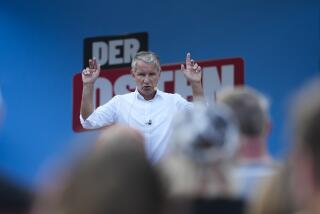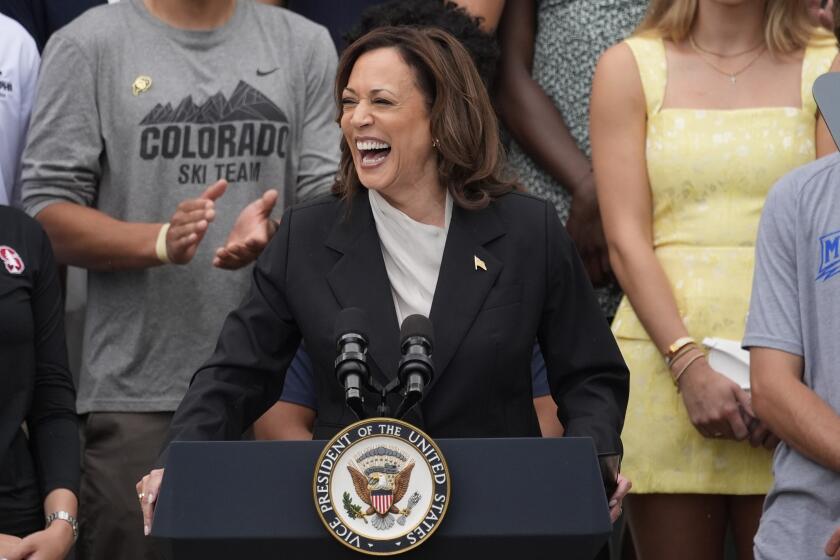Op-Ed: Germany’s refugee crisis turns it ominously to the right

Several hundred supporters of the Alternative for Germany party protest against the German government’s asylum policy on Jan. 9 2016.
For years Germany has been an outlier in Europe. While far-right agitators gained strength in neighboring countries, including France and Austria, German voters stuck solidly to their traditional postwar parties. Chancellor Angela Merkel’s center-right Christian Democrats, and the Bavarian sister party, the Christian Social Union, managed to contain extreme grievances within a big, unifying tent.
No longer. As Germany copes with an estimated 1.5 million refugees from the Middle East and North Africa, anti-immigrant sentiment is soaring. New political movements, massive weekly protests and arson attacks on the homes of refugees highlight the nation’s doubts and its divisions.
On New Year’s Eve, hundreds of Arab and North African men allegedly molested and harassed German women in a plaza near Cologne’s train station. Police were ineffectual and Germans, outraged. One rabble-rouser at a weekly anti-immigrant rally in Leipzig fired up the crowd by accusing Muslims of carrying out a “sex jihad” against “white, blond women.”
“All the parties in parliament are for refugees, and a large part of the media agrees,” Malte Lehming, an editor at the Berlin Tagesspiegel, told me, “but at least half of the population consists of enraged citizens who feel they have no political representation and are walking around with their fists in their pockets.”
Sound familiar? Just as populism is experiencing a comeback in America, so it’s taking hold in Germany. But given the history of German nationalism, it inevitably has a more ominous tinge.
Not that the current crisis is an exact replica of the early 1930s, when the Nazis came to power. Back then Germany was mired in an economic depression. More than 6 million of its citizens were unemployed. Its fledgling Weimar democracy was crippled by the memory of defeat in World War I and the humiliation heaped on it by the Treaty of Versailles. Today’s Germany is an economic powerhouse, and Merkel is the strongwoman of the European Union.
Nonetheless, Germany’s latest discontents carry some uncomfortable parallels with the past. Then, as now, the political elites are in a bind, looking over their shoulders as they try to placate the aggrieved and maintain power. Then, as now, Germans suddenly seem to have lost faith in the ability of the government to deal with a crisis. Then, as now, the populace is becoming radicalized.
The attacks in Cologne have crystallized those [refugee] challenges, and put Germans’ doubts on worldwide display.
The strongest signal of hostility toward the status quo is the precipitous rise of a political party called the Alternative for Germany. It’s attracting unprecedented numbers in public opinion polls. According to Bild, a national newspaper, Alternative for Germany would claim 11.5% of the vote if parliamentary elections were held today. That would make it the nation’s third-largest party, a force to be reckoned with. Merkel has already vowed never to form a coalition with it.
The Alternative party is not an explicitly fascist organization. It was founded in 2013 by conservative intellectuals and academics who repudiated both the European Union and immigration. But since then it has seized upon German fears to try to appeal to far-right voters. As Germans debated refugee policies last fall, Bjorn Hocke, a fiery party leader from the state of Thuringia, told a lecture audience: “As long as we are prepared to take on this population surplus, Africans’ reproductive habits will not change.” When Hocke appeared on national television, he ostentatiously placed a German flag over his chair, an audacious move in a country that has shunned outward displays of patriotism since World War II.
In an attempt to ward off the right, Germany’s Justice Minister announced Wednesday that he would propose new laws expediting the deportation of asylum seekers who have committed crimes. Merkel herself is toning down her public enthusiasm for refugees, saying that Germany is “vulnerable” in the face of the influx from the Middle East. Others in her party are adopting a tougher line: Kristina Schröder, Merkel’s former minister for family affairs, tweeted: “For far too long, we have overlooked a misogynist attitude among Muslim men.”
She has a point. For decades, Germany has had what political elites liked to call a Willkommenskultur — a welcoming culture. It was taboo among German liberals to talk about the downsides of immigration. Nevertheless, Germany, and especially the former East Germany, has a less than a rosy relationship with immigrants. Beneath gauzy rhetoric about welcoming foreigners, multicultural frictions simmer. German economic prowess was partly built on the back of Turkish Gastarbeiter, or guest workers. This euphemism was supposed to mean that these laborers would return to Turkey. They never did. Instead, they live largely in their own enclaves, barely integrated into wider German society.
Today’s massive refugee wave, however, poses a far greater test than assimilating the Turkish population. In September, Germany’s response to the crisis seemed reassuringly controlled and generous, captured in Merkel’s crisp, fearless catchphrase: “We can do it.” By December, news outlets were reporting defections in the ruling coalition and laying out daunting specifics about finding housing, jobs, schools and all the rest for more than a million newcomers.
Now the attacks in Cologne have crystallized those challenges, and put Germans’ doubts on worldwide display. Ever since reunification, their nation has asserted itself in Europe, looking outward, ruling confidently. If it substitutes truculent nationalism for that brand of leadership, Merkel’s dream of a united Europe will end. A continent bitterly divided by ethnicity will signal the return of demons Europeans thought they had exorcised long ago.
Jacob Heilbrunn is the editor of the National Interest and the author of “They Knew They Were Right: The Rise of the Neocons.”
Follow the Opinion section on Twitter @latimesopinion and Facebook
More to Read
A cure for the common opinion
Get thought-provoking perspectives with our weekly newsletter.
You may occasionally receive promotional content from the Los Angeles Times.










